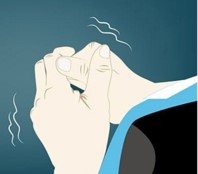
Ikerbasque Professor Dr. Mazahir T. Hasan at the Achucarro Basque Center for Neuroscience (Bizkaia, Spain) and Prof. Dr. Thomas Wichmann of Emory University, (Georgia, USA) have been awarded a prestigious exploratory grant by the National Institute of Health (USA), entitled, “Chemogenetic manipulation of neurons and astrocytes in the subthalamic nucleus to treat parkinsonism”.
Over the recent years, it is becoming increasingly clear that both neurons and astrocytes, which are present roughly equally in the mammalian brain, communicate with each other to organize complex behavior, including motor-related tasks, such as walking, grabbing objects and eating meals. In the Parkinson’s disease (PD), an area of the brain called substantia nigra, that produces dopamine, a crucial neurotransmitter for communication between nerve cells, is degenerated. Lack of dopamine disrupts various motor functions, resulting in resting-state tremor and uncontrolled shaking, making day-to-day life for individuals with PD is challenging, even to perform simple motor-related tasks.
Human patients with the PD are typically prescribed various drugs including levodopa, that can rapidly cross the blood-brain-barrier to replenish dopamine deficiency. Overtime, however, these drugs become gradually less effective. The other approach to alleviate motor-related dysfunctions in human patients is deep brain stimulation (DBS). This is done by implanting electrodes in the deep brain structure called the sub-thalamic nucleus for DBS to alleviate the symptoms of motor related dysfunctions. Although the DBS remarkably improves motor functions, it does not always work reliably on all patients, can be quite problematic over time, has multiple side-effects, including the development of cognitive disabilities.
In a synergistic research collaboration, Prof. Hasan, a neuroscientist and a synthetic biologist (who develop advanced genetic approaches to manipulate brain circuits) and Prof. Wichmann, a neuroscientist and a neurosurgeon (who routinely implants electrodes in human PD patients for DBS), have teamed up to treat the PD. The research teams will apply genetic therapeutic approaches in animal models to treat the PD-like conditions. They have hypothesized that genetically manipulating astrocytes and neurons in specific ways could serve as a viable treatment for the PD. If the genetic approaches designed in the Hasan lab show promising results in a preclinical trial in non-human primates (Wichmann lab) and rats (Hasan lab), then the researchers would submit a more extensive a 5-years grant (NIH RO1) and would also apply for a human clinical trial to treat the Parkinson’s disease.
.png)
